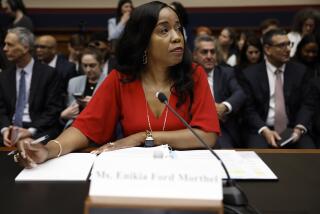Prelate Urges Boycott of Boston Schools’ AIDS Course
- Share via
BOSTON — Parents in this heavily Roman Catholic city are caught this week in a controversy over how to educate teen-agers against AIDS after Boston’s archbishop appealed to them not to permit their children to attend a new public school program that includes instruction on condom use.
Although school officials say it is too soon to know how many, if any, will refuse to allow their children to take the course, they plan to stand by their year-old plan to fully implement the new curriculum over the next few weeks.
In fact, the School Committee voted Tuesday night to eventually extend the program, now offered in grades 7 through 12, to even younger students, beginning in the fourth grade.
The committee has not yet decided whether it would be appropriate or necessary to teach elementary school children about condoms, committee President Thomas O’Reilly said.
Moral Danger Seen
Cardinal Bernard F. Law, in a letter read to parishioners at Mass last Sunday in churches throughout the city, warned: “The program to be offered in the Boston public schools could place our children in danger, both moral and physical.”
He said that the “valueless, amoral context” of the curriculum condones “permissiveness in sexual behavior that is not acceptable to a great many citizens of the city.”
Law noted also that condoms are not a fail-safe protection against AIDS and said that the instruction would give children “a false sense of security.”
As an alternative, beginning this fall, the archdiocese plans to offer to parochial school students, and to parents outside the Catholic school system, a “value-centered, comprehensive program of AIDS education” that places all of its emphasis on abstinence.
Condom Failures Cited
Sister Gretchen Gilroy said that condoms will be discussed only if students ask about them. In those cases, the young people will be reminded that the church does not advocate the use of condoms and that their ineffectiveness is demonstrated by the fact that they have a 10% to 15% failure rate in preventing pregnancy.
“To propose (condoms) as an adequate response to AIDS is scary,” she said.
School Committee member Robert Cappucci, the lone critic of the plan on the 13-member panel, agreed with the cardinal’s assertion that the school district policy amounts to encouraging teen-agers to engage in sex.
“Less people would do it if it wasn’t suggested that it’s safer to do it this way,” he said.
He objected also to the committee’s plan to offer AIDS education to elementary school pupils and sarcastically asked his fellow members: “Do they make condoms that small?”
Abstinence Stressed
In the two 45-minute AIDS education sessions to be offered at each grade level, the school system program focuses primarily on abstinence as the best means of prevention, but it includes instruction on the types of condoms available and how to use them.
Nationally, 91% of all schools offering AIDS instruction deal with the subject of condoms, according to a study released earlier this month by the nonprofit Alan Guttmacher Institute.
Sheldon Erlich, a spokesman for the Los Angeles school system, said that the city’s public school students, with their parents’ permission, receive education about AIDS in grades 5, 6, 7 and 10. For junior- and senior-high students, Los Angeles teachers use three-dimensional models to demonstrate how condoms are used.
O’Reilly, president of the Boston School Committee, was one of the churchgoers who heard the cardinal’s objections at Sunday services. He said he does not believe Law’s approach will work.
In an interview Wednesday, he argued, “You have to go beyond just telling children what they shouldn’t do in life. You’ve got to tell them that, if they choose to do things, these are the risks, and here are the steps they can take to mitigate the risks.”
Studies indicate that about half of today’s young people are engaging in sex by their 18th birthdays, which means some are inevitably being exposed to AIDS.
The American College Health Assn. reported Monday that its survey of 16,681 blood samples from students on 19 college campuses disclosed that two of every 1,000 appeared infected with the AIDS virus. That would suggest that 25,000 students are already infected, and the association predicted that the rate will rise unless officials take preventive steps.
School Committee member Daniel Burke, a guidance counselor and teacher at a Catholic high school in Boston, said the cardinal’s letter indicated that he is “not as in touch as he should be on this issue.”
At least two of Burke’s students have died of AIDS, he said. “Ideally, it would be nice to say (teen-age premarital sex) doesn’t happen, but it does.”
More to Read
Sign up for Essential California
The most important California stories and recommendations in your inbox every morning.
You may occasionally receive promotional content from the Los Angeles Times.













